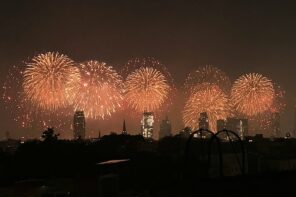Warning: Spoilers ahead
I dare say that nobody decides to watch the new Seth Rogen film An American Pickle as inspiration for the High Holidays. Like most people, my wife and I viewed it as a much needed diversion from the combination of a global pandemic and the heated political climate. Plus, I just like Seth Rogen.
And yet I came away from this zany dark comedy with a feeling that its release in the Hebrew month of Elul was no accident. Putting aside the loopy premise of a hapless shtetl Jew, Hershel Greenbaum, surviving 100 years in a vat of pickle brine only to emerge a century later unchanged, An American Pickle is really about death; or more precisely the way we become totally absorbed in it and the way we live our lives avoiding it.
Like you, every day I’m inundated with death counts occupying the top right corner of almost every news screen. It reminds me of listening, as a young adolescent, to the nightly news in the early 1970s as the anchor duly reported the number of US soldiers killed in Vietnam. After a while we became numb to the numbers. We bantered during the reportage, or got up to get a drink, either because we couldn’t bear to hear it, or because it became meaningless. Numbers are the entry point to the banality of death.
An American Pickle is a film about two people, who are really one person (Seth Rogen plays both roles), the hapless Herschel Greenbaum and his great-grandson Ben Greenbaum, a web and app designer who lives in hipster Williamsburg, Brooklyn. Herschel gets pickled in Brooklyn in 1919 and wakes in 2019, where he meets his great-grandson.
Herschel is a ditch digger in the Pale of Settlement before he comes to America because Cossacks burn down his village. He’s so destitute he can’t even afford a durable shovel. His life has no future, no prospects, no purpose. He wants two things only: to marry in order to have a child, and to be able to afford a burial plot for himself and his wife. His only hope is that his progeny will prosper because Herschel knows that for him there is only a wretched life, and a (hopefully) peaceful death. The only thing for Herschel to look forward to is the success of his future generations. And death.
When he emerges from the pickle vat in 2019 he desires two things: to meet any surviving family, and to mourn those who have passed—especially his beloved wife Sarah. In some ironic way, the one thing he could look forward to, death, eludes him. He miraculously survives when everyone he knows is gone. His entire Judaism becomes one thing: saying kaddish for the dead.
His great-grandson Ben is his doppelgänger. But Ben avoids death like the plague. He spends his days working restlessly for success. He hides photos of his family in a closet, and when Herschel asks him why he doesn’t have photos of them on his wall, he shrugs, saying “I haven’t yet fit it into my design.” We soon learn that Ben’s parents died tragically in a car accident five years before and Ben is living so as to avoid dealing with that tragedy. Life becomes a way to avoid death. When Herschel hears of the tragedy he asks Ben to tell him about it in all its gory detail, so “we will become bound in the tragedy [of death].” Ben demurs. Who in 2019 talks like that?
Both Herschel and Ben are angry men, for similar yet opposite reasons. Herschel is angry because his life has no meaning, and God took the only thing he hoped for: to live, and die, with Sarah. Ben is angry because he lives a life stuck in second gear: he can’t confront death and thus can’t quite come to terms with life. The avoidance of death paralyzes him; confronting death terrifies him.
The dark, twisted, and sometimes slapstick subplots as the film progresses are mostly irrelevant here though they do satisfy the need for diversion that brought us to the film in the first place. But death never really leaves us. Herschel comes to hate Ben because he refuses to mourn his relatives. And Ben comes to hate Herschel in part because Herschel refuses to let him avoid mourning his parents, which he’s never done.
On a deeper level, the typical American “happy ending” of the film belies a more profound lesson. Herschel recognizes that life is not only about mourning; and Ben recognizes that life is also about mourning. If all one does is mourn, there’s no relief from one’s anger against God. And if one cannot mourn, there’s no relief from one’s anger against God. The avoidance of death is as frightening as its inevitability.
And here we come to the High Holidays. It is indeed a strange phenomenon that most non-practicing American Jews (sometimes called “three day Jews”) expose themselves to Judaism only on Rosh Hashanah and Yom Kippur (and maybe Passover). I mean, seriously, if your Judaism is only three days, why make one of them a fast day? Why not celebrate Purim (which most Jews don’t do) since we at least get drunk while the other guys are dying.
But of course, it’s common knowledge that death fills the pews; not only among Jews, but in religions more generally. The Egyptian Book of the Dead, the Tibetan Book of the Dead, there’s no way to overestimate the way death evokes the need for religion of some sort. On Passover the pitch is, “They tried to kill us, God saved us, let’s eat.” On the High Holidays it’s a bit different; “God tried to kill us, God still might, let’s pray.”
The centerpieces of the High Holiday liturgy include Unetaneh Tokef (“Who will live and who will die”), the Martyrology on Yom Kippur (the story of the rabbinic martyrs during the Hadrianic persecutions in the second century CE), and Yizkor. All about death. Watching the hordes of worshippers filing into the synagogue before Yizkor one Yom Kippur, a congregant turned to me and said, “Rabbi, why don’t we just say Yizkor every day!” For Herschel Greenbaum that would be just fine.
My point is that many Jews live the double life of Herschel and Ben Greenbaum. During the year we’re like Ben: we work believing we have a future, we embrace the ideal of the very possibility of the “pursuit of happiness,” and we try to avoid confronting death as much as possible. Maybe not to the extent of Ben, but somewhere close.
And then on the High Holidays we suddenly become Herschel. We don’t just confront death (“life is like a passing shadow”), we relish in it; we read the gory details of the Ten Martyrs; and we are drawn like a magnet to the very place, the synagogue, we mostly avoid except for family events. In part this is because we’re taught to live like Ben and not Herschel. Herschel knew he had little to live for; one of his great desires was to once drink seltzer water and feel the bubbles. Ben has everything to live for, except he can’t really live because of his fear of death.
So An American Pickle is really a pickle (only now do I understand the double entendre). The pickle is the life of the Jew in a world where we not only can afford a durable shovel but we can pay other “Herschels” to do the digging. And we sanitize our lives so that death is mostly elsewhere. In 2020 that takes some doing. The Wizard of Oz’s “pay no attention to the man behind the curtain” becomes “pay no attention to the numbers on the top right of your screen.” In the Iraq War the government refused to televise the coffins arriving at Andrews Air Force Base. Let’s be Ben Greenbaum as long as we can.
I once heard a teaching by Shlomo Carlebach (perhaps borrowed from elsewhere) about the “Six Million” who perished in the Holocaust. “I don’t like the term six million,” he said, “Six million Jews were not murdered in the Holocaust. Rather, one Jew was murdered, then another, then another, then another…six million times.” But, really, who could live like that?
So who’s really the hero in this film? The irascible but lovable Herschel Greenbaum who has little to lose because he has nothing—nothing, that is, except for kaddish, except for death? Or Ben Greenbaum, a hapless hipster who seems to have much to gain, though everything eludes him because he can’t quite face the tragic death of his parents?
Not much time to ponder. We must prepare for the annual transformation from Ben to Herschel. If you pay close attention to the liturgy, what awaits you in synagogue or a Zoom screen isn’t apples and honey, but Herschel Greenbaum. And he’s angry at God. And God seems to be angry back.
Leave your lucrative business at the door and pick up a broken shovel. On Rosh Hashanah and Yom Kippur we are all ditch diggers like Herschel as the layers of human ingenuity to avoid death get ripped away leaving us with the words of young Ben when an old Jew asks him what he’s doing in a synagogue saying kaddish in a run-down Ukrainian village in 2019. “I’ve lost some people,” Ben says. And with those words he embraces his inner Herschel.





